A funded scheme to support progress in genomics and workforce transformation
In partnership with Genomics England and NHS England, the Genomics Education Programme (GEP) funded a number of research secondments and academic fellowships across the NHS, working in collaboration with the Genomics England Clinical Interpretation Partnership.
The fellowship scheme is intended to boost scientific and research expertise within the health service and support the workforce transformation activities associated with mainstreaming genomics in the NHS.
The nine successful candidates began their academic research projects in 2018, and all projects will be completed by 2021. Find out more about the fellows, and their projects, below.

The fellows
Post-doctoral | 2 years | Full time

Jamie Ellingford
Using bioinformatics to evaluate and integrate genomic variation impacting gene expression and regulation.
Read more about Jamie’s project here.
Post-doctoral | 2 years | Full time
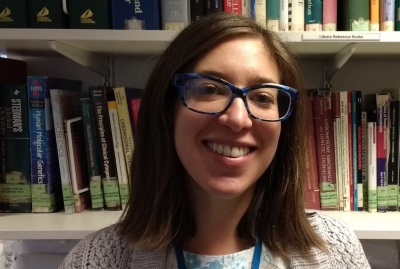
Celine Lewis
Exploring and enhancing decision-making about genome sequencing among young people.
Read more about Celine’s project here.
Post-doctoral | 4 years | Part time

Richard Turner
Evaluating the potential of pharmacogenomics using whole genome sequences to reduce drug toxicity.
Read more about Richard’s project here.
Post-doctoral | 2 years | Full time
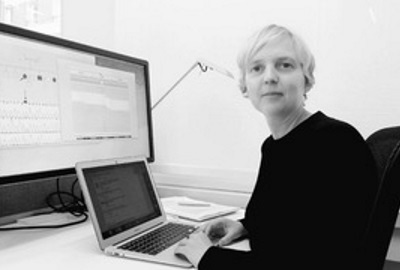
Jana Vandrovcova
The utility of whole genome sequencing in clinical-grade diagnostics of hereditary neurological disorders.
Read more about Jana’s project here.
Doctoral | 3 years | Full time

Niamh Appleby
Clinical utility of plasma-based ultra-sensitive detection methods for high-risk chronic lymphocytic leukaemia and lymphoma.
Read more about Niamh’s project here.
Doctoral | 3 years | Full time
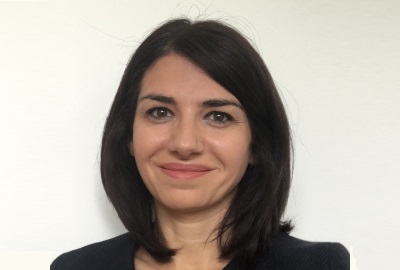
Secondment | 2 years | Part time
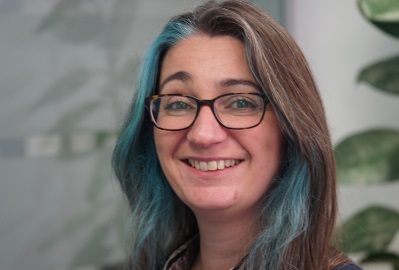
Lisa Ballard
Family communication of results from the 100,000 Genomes Project: designing an online intervention.
Read more about Lisa’s project here.
Secondment | 1 year | Full time
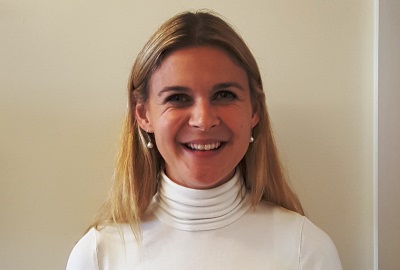
Secondment | 2 years | Part time
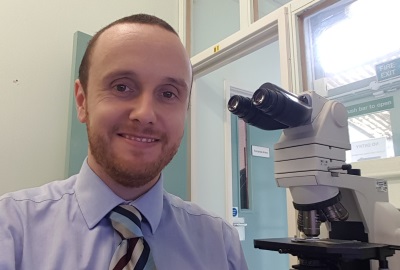
The projects
EIGER: a bioinformatics approach to evaluate and integrate genomic variation impacting gene expression and regulation
A major objective of Jamie’s research is to identify pathogenic variants in the non-coding genome that underpin rare diseases. Initially, the project will focus on disorders within the hearing and sight and cardiovascular GeCIP domains, with the expectation that establishing an analysis framework for these disorders will enable integration and expansion to other clinical specialties.
The project involves both bioinformatics and laboratory-based analyses, including the interrogation of publicly available resources from the ENCODE project, the use of phenotype-driven variant analysis tools and the creation of patient-specific RNA-seq and chromatin conformation datasets. As a result of this fellowship, Jamie aims to release computational tools and strategies that will assist with the identification of pathogenic variants in the non-coding genome.
About Jamie
To date, Jamie has completed a BSc in Biology at the University of Sheffield, an MRes in Translational Medicine (‘bench-to-bedside’) at the University of Manchester, a PhD in Genomics at the University of Manchester, and has also worked as a research bioinformatician at the Central Manchester NHS Foundation Trust.
Jamie’s PhD thesis was based on research focused on computational strategies to identify novel disease-causing variation underpinning rare diseases through WGS, WES and custom gene panel approaches. Although this project was largely computational, he also spent a considerable amount of time in the wet laboratory. Going forward, Jamie has plans to develop his skills in both of these areas, although a major focus will be computational.
The big questions that drive Jamie’s research interests are evolutionary genomics, and applied ‘omics in healthcare. Jamie’a research fellowship will bring both these interests together and will be based at the Manchester Centre for Genomic Medicine in the central Manchester teaching hospitals.
Aside from genomics, Jamie’s interests are sports, music and travel – so, for him, Manchester is an ideal place to live. A highlight from his PhD studies was a three-month trip to India to work in a bioinformatics institute.
Exploring and enhancing decision-making about genome sequencing among young people
During this two-year post-doctoral fellowship conducted at Great Ormond Street Hospital, Celine is hoping to capitalise on young people’s involvement in the 100,000 Genomes Project. The aim of her research is to gain insight into young people’s (11-21 years) motivations and attitudes towards whole genome sequencing (WGS), including their knowledge and understanding of WGS, their motivation for consenting, their appreciation of how WGS results might impact them, and their views regarding receipt of secondary findings. To do this, Celine will interview young people who have been invited to take part in the 100,000 Genomes Project. This research will provide data that will be valuable to the development of policy recommendations and professional guidelines tailored to this age group.
A further aspect of her research will be to develop and evaluate an animation that explains genome sequencing to young people. Celine intends to do this by conducting a randomised controlled trial to examine; (a) whether the animation increases knowledge about WGS, (b) whether the animation impacts young people’s hypothetical willingness to undergo WGS; and (c) young people’s satisfaction with the animation. If the animation is well received, it could be a valuable communication aid for healthcare professionals explaining WGS to young people.
About Celine
Celine Lewis is a behavioural scientist based at Great Ormond Street Hospital. Celine’s main area of interest is the psychosocial impact of genetic and genome technologies, in particular how patients and families relate to and make decisions around personal genetic information, and the subsequent emotional and behavioural impact.
Celine has a bachelor’s degree in philosophy, a master’s degree in medical ethics and a PHD in health psychology. Her dream job would be presenting Desert Island Discs and she recently dressed up as an ice-cream and drove around India in an Ambassador taxi to raise money for charity.
Evaluating the potential of pharmacogenomics using whole genome sequences to reduce drug toxicity
The NHS in England spent £15.5bn on medicines in 2014-15, and drug expenditure is rising. There is, however, notable variation between patients in response to a given drug, affecting both efficacy and safety.
Pharmacogenomics is the study of the genetic determinants of drug response and their application to improve patient care. Most pharmacogenomics research has focused on common genetic variants. However, the majority of variants within gene regions (~98%) occur in less than 1% of people. Therefore, this fellowship aims to determine the impact of rare genetic variation on adverse drug reactions (ADRs) and healthcare utilisation using the world-leading 100,000 Genomes Project.
First, during this fellowship all genetic variants in a large set of drug-relevant genes will be catalogued. Secondly, the impact of genetic variation (common and rare) on ADRs and healthcare use associated with specific therapeutics (fluoropyrimidines, irinotecan, statins, oral anticoagulants and citalopram/escitalopram) will be investigated using genetic association and cost consequence analyses. Novel natural language processing techniques will identify the ADRs from 100,000 Genomes Project participant records. It is envisaged that this fellowship will increase the pharmacogenomics evidence base and inform clinical guidelines.
About Richard
Dr Richard Turner is a registrar in clinical pharmacology and therapeutics (CPT) with an interest in pharmacogenomics and precision medicine. He graduated in medicine in 2010 from the University of Cambridge. He completed his foundation training in the East of England deanery between 2010-12, which included a CPT academic component investigating the pharmacogenomics of fluoropyrimidine toxicity.
Richard moved to Liverpool in 2012 after being awarded an NIHR academic clinical fellowship in CPT. During his two years in Liverpool he completed core medical training and was involved in a large cardiovascular pharmacogenomics study. From 2014-17 Richard undertook a sustained period of doctoral research as a Medical Research Council fellow on the north-west England MRC CPT fellowship scheme, investigating the pharmacogenomics of statin-induced muscle toxicity.
In his spare time, Richard enjoys running, both cross-country and now around the room after his crawling baby.
A search for the missing: the utility of whole genome sequencing in clinical-grade diagnostics of hereditary neurological disorders
The implementation of whole genome sequencing into routine clinical practice through the pioneering work of the 100,000 Genomes Project has a great promise to dramatically change diagnoses and treatments of patients with rare disorders. During her research Jana is aiming to maximize the potential of whole genome sequencing by implementing additional bioinformatics pipelines to identify mutations not fully investigated using current protocols.
This will include:
- The identification and validation of structural, copy number and repeat expansion variants, which are a particularly common cause of many neurological disorders.
- Using in-house generated transcriptomic data, to identify and validate variants located in intra and intergenic regions that are expressed in relevant tissues, such as human brain and muscle, but are not part of the current genome annotation.
- Making use of large patient datasets and deep phenotype information to identify novel disease genes and genetic modifying factors.
About Jana
Jana is a geneticist and bioinformatician with a longstanding interest in molecular diagnostics and advancing genetic-driven personalised treatment. After obtaining her PhD (2006) in biomedicine on the genetics of colorectal cancer (Karolinska Institutet, Stockholm and Charles University, Prague), she received postdoctoral training at the Institute of Neurology, UCL (2006-10) and later at the Medical Research Council’s Clinical Sciences Centre at Imperial College London (2011-14).
During this time Jana was involved in genomics and next-generation sequencing projects in several clinical areas, including neurodegeneration, familial hypercholesterolemia and connective tissue disorders. Jana has always been drawn to large-scale computational data analysis and its potential to revolutionise patient care. In 2010 Jana undertook a master’s degree in bioinformatics at Birkbeck, University of London, and a subsequent one-year employment as a user support officer at the European Bioinformatics Institute, Hinxton.
In 2014, Jana returned to the Institute of Neurology to continue research into the genetics of neurological diseases and became a bioinformatics lead of several rare diseases and dementia-focused projects. Jana’s work incorporates genetic mapping, genomic analysis as well as gene expression profiling, and plays an important role in novel gene discovery.
Development and evaluation of the clinical utility of plasma-based ultra-sensitive detection methods for high-risk chronic lymphocytic leukaemia and lymphoma
Chronic lymphocytic leukaemia (CLL) is the most common adult leukaemia and, while treatable, patients relapse after chemo-immunotherapy. In a minority, CLL transforms to high-grade lymphoma; Richter’s syndrome (RS).
New, costly drugs based on understanding how leukaemia cells survive offer effective alternatives to chemo-immunotherapy for selected patients, making it important to identify before treatment which patient will benefit.
Specific changes in the leukaemia DNA (somatic mutations) predict clinical outcomes and help decide which therapy is suitable for each patient. CLL affects white cells, marrow and lymph nodes, but previous studies concentrated on blood or marrow DNA, not lymph nodes. Somatic mutations arising in lymph nodes are thought responsible for relapse, treatment-resistance and RS.
Cancers release fragments of tumour DNA into blood plasma. Studying plasma-circulating tumour DNA (ctDNA) offers a biopsy-free method to detect somatic mutations. Plasma ctDNA from lymph node, marrow and leukocytes will be detectable, providing a complete picture of CLL somatic mutations.
Niamh’s study will identify how best to detect CLL somatic mutations in ctDNA. Then, she will compare ctDNA with mutations identified from CLL/RS cells to learn how ctDNA mutations impact on response to different therapies in patients enrolled in the 100,000 Genomes Project and CLL/RS clinical trials.
About Niamh
Niamh is an Irish clinical haematology doctor based in the Oxford Molecular Diagnostics Centre. She graduated from the School of Medicine at Trinity College Dublin and completed postgraduate training in haematology in Ireland before completing additional training in diagnostic haematopathology in the UK.
Her career interests include molecular diagnostics and the application of genomic technologies to direct and personalise therapy for patients with haematological cancers.
While settling into Oxford life by learning to punt on the river, Niamh has been getting involved with the Oxford NHS Genomic Medicine Centre and the haematological malignancy programme in particular. Her project examines sequencing technologies for plasma-circulating tumour DNA and how circulating tumour DNA might be applied in to examine genomic changes in the lymphatic tissue, to predict treatment response and identify impending relapse.
Functional validation of predicted synthetic lethal interactions in colorectal cancer patients
The aim of Dimitra’s PhD project is to identify new genetic targets for personalised treatment of colorectal cancer based on the concept of synthetic lethality.
The inactivation of genes as a result of cancer alterations is not always deleterious for the cells because alternative genes or pathways can act as functional compensators of the lost functions. These compensations are important for cell survival but at the same time represent acquired cancer vulnerabilities that can be exploited for cancer treatment.
This study aims to identify the functional compensators of cancer-specific inactivated genes and validate them in primary cultures derived from patients with colorectal cancer. Eligible patients underwent surgery for colorectal cancer, have given consent for whole genome sequencing within the 100,000 Genomes Project and additional tissue sampling for King’s Health Partners’ cancer biobank. Their whole genome sequence data is used to identify loss-of-function mutations and their potential functional compensators based on sequence identity, biochemical pathways and interaction network data. The predictions will be validated in primary cell cultures derived from the colorectal cancer and the matched normal control.
About Dimitra
Dimitra is a medical doctor and her clinical and research interest lies in gastrointestinal oncology and especially colorectal cancer.
Originally from Greece, she graduated from the Medical School of the University of Thessaly. During her training in medical oncology, she was awarded a scholarship from the Hellenic Society of Medical Oncology and decided to come to London in 2013 to continue her training at Guy’s and St. Thomas’ NHS Foundation Trust. In 2016, she moved into full research, funded by a BRC/NIHR clinical research fellowship and joined the Ciccarelli lab at King’s College London. The group is now based at the Francis Crick Institute, where all laboratory work is done.
Family communication of results from the 100,000 Genomes Project: designing an online intervention
Lisa is carrying out a qualitative study to explore ways in which patients can be encouraged to share genetic health information with their at-risk relatives. This is important because the result of an individual’s genomic test can predict risks in close relatives, but research has shown that patients do not always communicate their results to all at-risk relatives. Without such information, relatives can be left in the dark and unable to make informed decisions about their own testing, screening programmes, or preventative treatment. To date, there have been several interventions designed to aid family communication of genetic results, although most have proven ineffective and have no theoretical underpinning.
First, Lisa will interview participants from the 100,000 Genomes Project and explore ways of increasing patients’ capability, opportunity and motivation to encourage communication of relevant genetic test results, and ameliorate potential psychosocial concerns surrounding such communication. Secondly, using the data from the interviews, she will develop an online intervention based on the latest behaviour change theories and frameworks. The intervention will not only be practical and effective, but also grounded in patient experience and opinion, acceptable to patients, and useful for specialist and non-specialist health professionals.
About Lisa
Lisa is a research fellow at the University of Southampton, with a degree in psychology, a Master’s in health psychology and a doctorate in health psychology, which she completed earlier this year. Lisa has worked in the primary care sector for 10 years in smoking cessation research and behaviour change interventions. Her current role is in clinical ethics and law, researching consent and behaviour change in clinical genetics.
In her spare time, she plays roller derby (“rugby on wheels basically”) and helps to organise the Sunday Assembly Southampton, a secular community group whose motto is ‘Live better, help often, wonder more’.
Using cancer phenotypes to improve cancer susceptibility gene classification
Breast cancer is the most frequently diagnosed cancer among women in the UK. Next-generation sequencing, including panel tests, are increasingly being utilised in mainstream cancer diagnostic practice to determine germline cancer susceptibility.
While this technology holds great potential for clinical benefit, it also significantly increases the rate of variants of uncertain significance (VUS) with commensurate increase in molecular scientist workload and risk of harm through incorrect interpretation.
During this one-year research secondment, Stephanie aims to determine whether we can utilise somatic mutational profiles and histopathological subtypes to better define the pathogenicity of VUS in both BRCA and other breast cancer genes.
Genetic sequence data will be derived from breast cancer patients recruited to the 100,000 Genomes Project and Prospective Outcomes in Sporadic versus Hereditary breast cancer (POSH) study. It will be used to determine the relationship that exists between germline variation in high, intermediate and moderate risk genotypes (BRCA1, BRCA2, PALB2, ATM, CHEK2 and TP53) and reported histopathological tumour phenotype and somatic mutational profile (3-5). This should enhance routine NHS diagnostic practice by increasing the utility of genomic testing at the point of cancer diagnosis. This will be achieved through improved VUS classification and increased opportunities for risk-stratified prevention.
About Stephanie
Stephanie Greville-Heygate is a specialist registrar in clinical genetics for the Wessex Clinical Genetics Service. She has a specific interest in cancer genetics and developing the interface that exists between oncology and genetics. Her research project will contribute towards a medical doctorate under the supervision of Professor Diana Eccles and the Department of Cancer Sciences at the University of Southampton.
Stephanie completed her undergraduate studies at the University Of Leeds School Of Medicine, where she graduated with honours and was awarded the William Hey Medal. More recently, she has undertaken a Master’s degree in Genomic Medicine at the University of Southampton. Over the last 10 years, she has worked in London, Brighton, New Zealand and Southampton in several positions focused on oncology and genetics. Her current research interests have developed through this professional and academic experience.
Stephanie lives close to the New Forest with her husband and four children.
Germline alteration in osteosarcoma and malignant peripheral nerve sheath tumour genomes
During Daniel’s two-year research project, he is aiming to spend 80% of the time undertaking research and 20% of the time providing the clinical service with colleagues at the RNOH.
It is now recognised that a significant number of patients, particularly those under the age of 25, harbour a constitutional predisposition to developing cancer. Osteosarcoma and malignant peripheral nerve sheath tumour (MPNST) are two sarcomas occurring in young patients that are associated with such mutations.
Daniel will analyse germline whole genome sequencing data in these patients to address the unmet need of the interpretation of these alterations in those with sarcoma. He will generate a manually curated germline panel and design a clinical pathway for the interpretation of such data and the delivery of these results to patients in a clinical setting. Daniel then hopes to implement this panel in sarcoma centres across the UK. The somatic mutational landscape of both sporadic and neurofibromatosis-associated MPNST will also be analysed.
This research aims to implement the analysis of osteosarcoma and MPNST patient’s germline DNA as part of routine practice. This will help to identify those who are at higher risk of developing second malignancies to allow appropriate follow-up screening and will inform genetic counselling of family members.
About Daniel
Daniel is a post-CCT (certificate of completion of training) clinical and research fellow working at the Royal National Orthopaedic Hospital in North London. Daniel’s family are from Liverpool and he was born in Merseyside. Daniel grew up in the Manchester area, where he sat his A-levels and then went on to study medicine at the University of Nottingham. He quickly developed an enthusiasm for pathology and an understanding of the mechanisms of disease, and was inspired by lectures from Professor James Lowe, an expert neuropathologist.
In August 2011, Daniel started specialist training in histopathology at Nottingham University Hospitals and obtained fellowship of the Royal College of Pathologists in October 2015. Upon completing his training, he obtained a clinical and research fellowship post at the Royal National Orthopaedic Hospital to develop expertise in soft tissue and bone sarcoma pathology.


